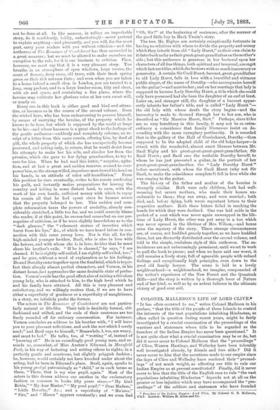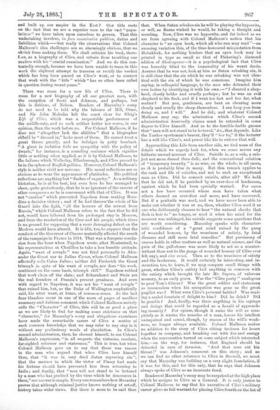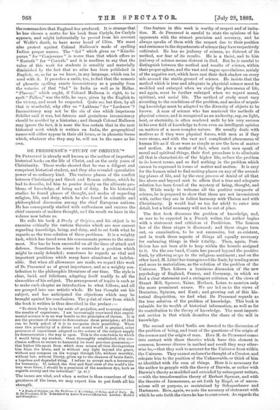COLONEL MALLESON'S LIFE OF LORD CLIVE.* "Jr has often occurred to
me," writes Colonel Malleson in his preface, "that the title of the people of these Islands to control the interests of the vast populations inhabiting Hindustan, so often called in question during recent years, might be fairly investigated by a crucial examination of the proceedings of the warriors and statesmen whose title to be regarded as the founders of the Indian Empire has never been questioned." It is not quite clear what a crucial examination may be or do, bat did it never occur to Colonel Malleson that the " proceedings " of Clive, Warren Hastings, and Wellesley have been tolerably well investigated already, by friends and foes alike ? Did it never occur to him that the accretions made to our empire since the days of Clive and Wellesley have rendered their " proceed- ings " of not much weight, as affecting our title to rule our Indian Empire as at present constituted ? Finally, did it never occur to him that the title of the English race to rule "the vast populations inhabiting Hindustan" depends not at all on the greater or less injustice which may have accompanied the "pro- ceedings " of the soldiers and statesmen who have founded • Founders of the Indian Empire: lord Clive. By Colonel G. B. Mallwon, 08.1. London : William H. Allen and Co.
and built up our empire in the East ? Our title rests on tha fact that we are a superior race to the vast " popu- latioas " we have taken upon ourselves to govern. That this undertaking involves, in foro conscientio3 publicce, duties and liabilities which—but really the observations that Colonel Malleson's idea challenges are so alarmingly obvious, that we skrink from making them. We shall criticise his book, there- fore, as a biography of Clive, and refrain from troubling our readers with his "crucial examination." And we do this con- tentedly enough, because we have been unable to trace in this work the slightest attempt to traverse or rectify the verdict which has long been passed on Olive's work, or to connect that work with the " title " which "bas so often been called in question during recent years."
There was room for a new life of Clive. There is room for a new biography of all our greatest men, with the exception of Scott and Johnson, and perhaps, but this is dubious, of Nelson. Readers of Macaulay's essay do not need to be told why the labours of Mill, Orme, and Sir John Malcolm left the coast clear for Gleig's Life of Clive, which was a respectable .performance of the middle-rats, and as such neither better nor worse, in our opinion, than the work before us. For Colonel Malleson, if he does not "altogether lack the abilities" that a biographer shbuld be "dressed in," lacks most of them. He cannot treat a great theme greatly, and he indulges in petty bombast. "A giant in isolation feels no sympathy with the policy of dwarfs," for instance, is a sounding sentence which signifies little or nothing when applied, as it is by Colonel Mallesou, to the failures which Wellesley, Ellenborough, and Clive proved to hem the sphere of English politics. Moreover, Colonel Malleson's style is neither vivid nor nervous. His moral reflections are so obvious as to wear the appearance of platitudes. His political reflections are anything but "flashes of sagacity." As a military historian, he is at his best, but even here he has managed to show, quite gratuitously, that he is as ignorant of the careers of other conquerors as he is conversant with that of Clive. It was not "caution" which prevented Napoleon from making Boro- dino a decisive victory ; and if be had thrown•the whole of his Guard into the fight, "all the horrors of the retreat from Russia," which Colonel Malleson refers to the fact that he did not, would have followed from his prolonged stay in Moscow, and from the resolution of the Czar and his people, which there is no ground for supposing that a more damaging defeat on the Moskwa would have altered. It is idle, too, to suppose that the conduct of the Governor of Craone materially affected the result of the campaign in France in 1814. That was a foregone conclu- sion from the hour when Napoleon wrote, after Moutmirail, to his representatives at Chatillon to take a less humble attitude. Again, "want of scruple" was not fatal personally to Alex- ander the Great nor to Julius Cwsar, whom Colonel Malleson affectedly calls Caius Julius ; neither did Frederick the Great triumph in spite of his want of scruple, nor does "his work, continued on the same basis, triumph still." Napoleon rubbed that work clean off the slate; and Scharnhorst and Stein are the real founders of Prussia's present greatness. And even with regard to Napoleon, it was not his "want of scruple" that ruined him, but, as the Duke of Wellington emphatically said, his utter want, at times, of common-sense. As the last four blunders occur in one of the score of pages of needless summary and dubious comment which Colonel Malleson naïvely calls the " Character " of Clive, this will be as good a place as we are likely to find for making some strictures on that "character," for Macaulay's essay and ubiquitous examiners have made the remarkable career of Clive a matter of such common knowledge that we may refer to any step in it without any preliminary words of elucidation. In Clive's second administration, then, he showed himself, to use Colonel Malleson's expression, "in all respects the virtuous, resolute, far-sighted reformer and statesman." This is true, but when Colonel Malleson goes on to say that there was reason in the men who argued that when Clive bore himself thus, that "it was in very deed Satan reproving sin "; that the manner in which the victor of Plass,' had made his fortune should have prevented him from returning to India ; and finally, that "men will not stand to be lectured by a man who has profited by the vices which he denounces in them," our answer is simple. Every one remembers how Macaulay proves that although criminal justice knows nothing of set-off, history takes wider views. But there is more to be said than that. When Satan rebukes sin he will be playing the hypocrite, or will, as Burns wished he would, be taking a thought and mending. Now, Clive was no hypocrite, and far indeed as we are from agreeing with Colonel Malleson's notion that his character is "an open book, which all who run may read "—an amusing variation this, of the time-honoured misquotation from Habakkuk, for nothing hinders that an open book may be printed in type as small as that of Pickering's diamond edition of Shakespeare—it is a psychological fact that Clive was honestly blind to the immorality of his worst deeds. Assume that he was not, look at him as Satan rebuking sin, it is still clear that the sin which he was rebuking was not iden- tical with the sin of which he was conscious. Imagine him saying, in colloquial language, to the men who defended their own Inches by identifying it with his own :—"I sheared a shep- herd, closely belike and cruelly perhaps ; but he was an evil shepherd to his flock, and if I went too fast and too far, what matter P But you, gentlemen, are bent on shearing more closely and cruelly the sheep themselves. I can keep you from doing so, and I will." And he did ; and whatever Colonel Malleson may say, the admiration which Olive's second administration deservedly claims must be extended in some degree to Clive himself. And as to the forcible-feeble gnome that" men will not stand to be lectured," &c., that depends. Like the Yankee sportsman's beaver, they'll "hey to," if the lecturer has a will like Olive's, and power like his to enforce that will.
Approaching this Life from another side, we find none of the details which we eagerly look for, when we come across any hitherto unread account of Clive. Suicide is, as a rule, a sub- ject not more dismal than dull; and the conventional solution of "temporary insanity" is as wise, on the whole, in all cases, as it is probably false in many. But this remark applies to the rank and file of suicides, and not to such an exceptional man as Clive. Did he commit suicide, after all? We hold that he did not, if be perished by an over-dose of laudanum, against which he had been specially warned. For cases not a few have occurred where men have taken what others deemed an over-dose and more, and have recovered. But if a penknife was used, and we have never been able to make out whether it was or no, then, whether Clive used it as one who deliberately chooses to bear " the natural shocks that flesh is heir to" no longer, or used it when his mind for the moment was unhinged, his suicide suggests some questions that are worth considering. Macaulay speaks with character- istic confidence of a "great mind ruined by the pang of wounded honour, by the weariness of satiety, by fatal diseases and still more fatal remedies." But parsimony of causes holds in other matters as well as natural science, and the pain of the gall-stones was more likely to act- as a counter- irritant than not to the pangs of wounded honour (if Clive ever felt any), and vice versci. Then as to the weariness of satiety and the laudanum. It would certainly be interesting, and in- structive, too, to learn, if we may compare small things with great, whether Clive'e satiety had anything in common with the satiety which brought the late Mr. Sayers, of valorous memory, to an early grave. Was the "Olive party" analogous to poor Tom's Circus ? Was the great soldier and statesman as resourceless when his occupation was gone as the great pugilist was ? What were Olive's personal habits? Was read- ing a sealed fountain of delight to him ? Did he drink ? Did he gamble ? And, finally, was there anything in his sayings and doings that could be regarded as a herald of approach- ing insanity ? Fur opium, though it ruins the will as com- pletely as it wastes the muscles of a man, leaves his intellect unimpaired and sound, though, by reason of the will's weak- ness, no longer always available. Colonel Malleson makes no addition to the story of Cfive sitting taciturn for hours together in company, and breaking out with fire and energy when the conversation turned on some subject which interested him,—on the way, for instance, that England should be defended in case of invasion. "And that man cut his throat!" was Johnson's comment on this story ; and as we can find no other reference to Clive in Boswell, we must say that Macaulay was building on a very slight foundation, if it was for this, and for this only, that he says that Johnson always spoke of Clive as an incarnate fiend.
Readers of Macaulay's essay may be surprised at the high place which he assigns to Clive as a General. It is only justice to Colonel Malleson to say that his narrative of Olive's military career gives us full warrant for placing Clive fourth on the list of
the commanders that England has produced. It is strange that he has chosen a motto for his book from Carlyle, for Carlyle appears, and might inferentially be proved from his account of Wolfe's death, to have never heard of Clive. We most also protest against Colonel Malleson's mode of spelling Indian proper names. The " fad " which gives us "Kanchi- puran " for " Conjeveran " is worse than that which offers us "Korinth " for "Corinth," and it is needless to say that the value of this work for students is sensibly and materially diminished by the fact that no atlas has been published in English, or, so far as we know, in any language, which can be used with it. It provokes a smile, too, to find that the nemesis of phonetic spelling exacts inconsistency as a penalty from the votaries of that "fad" in India as well as in Hellas. "Plassey," which ought, if Colonel Malleson is right, to be spelt " Pahise," was the title, be says, given by the English to the victory, and must be respected. Quite so; but then, by all that is wonderful, why offer us " Lakhnao " for "Lucknow "? Inconsistency may not be the sin of sins which impetuous Schiller said it was, but fatuous and gratuitous inconsistency should be avoided by a historian ; and though Colonel Malleson may ignore the fact, it is none the less certain that in the next historical work which is written on India, the geographical names will either appear in their old forms, or in phonetic forms which, whatever else they may be, will not be the same as his own.




































 Previous page
Previous page